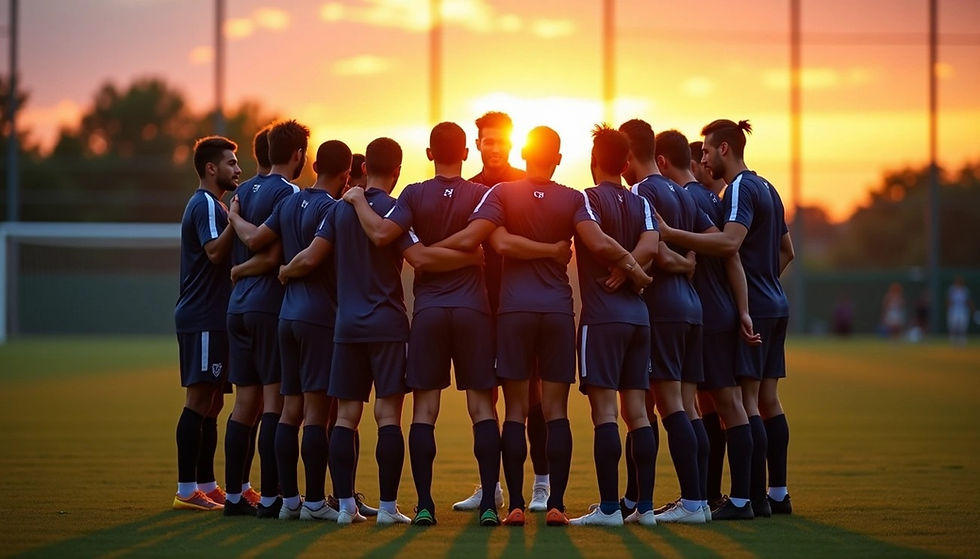How a Soccer Player Can Regain Focus
- Dr Paul McCarthy

- May 28, 2025
- 4 min read
Maintaining focus during games and training is crucial for soccer players. In high-pressure situations, it's easy to get distracted or overwhelmed. Luckily, there are several powerful strategies to help players regain focus and enhance their performance. This blog post will explore mindfulness, breathing exercises, visualization techniques, and setting short-term goals, offering practical tips for players at all levels.
The Importance of Staying Present
Being present in the moment is key for soccer players. When athletes allow their minds to wander, they may lose track of the game, miss important plays, or make critical mistakes. Staying present helps to sharpen focus, improve decision-making, and boost overall performance.
One technique that can help players to stay present is mindfulness. Mindfulness involves paying attention to the current moment without judgment. Players can practice mindfulness during their training sessions by concentrating on their movements, breathing, and the sounds around them. Techniques such as mindful dribbling, where players focus solely on the ball, can enhance concentration and reduce distractions.

Breathing Exercises for Enhanced Concentration
Breathing exercises are another effective way for soccer players to regain focus. When tension builds during a game, players often experience shallow breathing, which can amplify anxiety and distractions. By incorporating deep breathing techniques, players can calm their minds and bodies, thus improving their concentration.
One simple exercise is the 4-7-8 breathing technique. Players can follow these steps:
Inhale deeply through the nose for a count of 4.
Hold the breath for a count of 7.
Exhale slowly through the mouth for a count of 8.
Practicing this technique for just a few minutes can help players feel grounded and focused when they step onto the pitch.

Visualization Techniques for Success
Visualization is a powerful mental technique often used by elite athletes, including soccer players. It involves imagining successful performances in detail, which can help boost confidence and reinforce focus during games.
Players can practice visualization by setting aside a quiet moment before a match or training session. They should close their eyes and vividly picture themselves executing specific skills, such as making a perfect pass or scoring a goal. By visualizing these actions, athletes can mentally prepare themselves for success.
Moreover, they can create a "success playlist" of images or words that inspire them, such as their favorite goals or memories. This mental imagery can be a source of motivation and can help players stay positive and focused throughout their performance.
Setting Short-term Goals
Setting short-term goals is an effective way for soccer players to maintain focus during a match or training. Goals provide a clear direction and something tangible to concentrate on. For example, a player might set a goal to successfully complete a specific number of passes or tackles during a game.
These goals should be specific, measurable, achievable, relevant, and time-bound (SMART). By breaking down performance into smaller, manageable objectives, players can maintain their focus and avoid becoming overwhelmed by the bigger picture.
Tracking progress throughout a game or training session can also keep players engaged. They can reflect after each quarter or half, adjusting their focus based on their performance against their short-term goals.
Managing Distractions on the Field
In the fast-paced environment of soccer, distractions can come from various sources, including the crowd, opposing players, or even personal thoughts. Recognizing and managing these distractions is vital for maintaining focus.
Players can develop techniques to mitigate distractions, such as creating positive affirmations. By having a few phrases or words ready to refocus their minds, players can quickly shift their attention back to the game. Phrases like "stay calm" or "focus on the game" can be powerful reminders.
Additionally, acknowledging that distractions will happen can help players become more resilient. Instead of fighting against these interruptions, they can accept them and gently guide their focus back to the task at hand.

Building Mental Resilience and Regain Focus
Building mental resilience is essential for soccer players to bounce back from setbacks and stay focused. Resilience allows athletes to face challenges and maintain their concentration even when the game does not go as planned. One way to build this skill is through self-reflection.
After matches or training, players should take time to reflect on their performance. They can ask themselves what went well, what could have been improved, and how they can apply those lessons moving forward. This practice encourages a growth mindset, which is crucial for long-term development and focus.
Additionally, maintaining a healthy balance between sport and personal life can elevate mental resilience. Engaging in hobbies, spending time with family, and practicing self-care can provide players with a much-needed break from soccer, allowing them to return to the game with renewed focus.
Incorporating mindfulness, breath work, visualization techniques, and goal setting into a player’s routine can significantly enhance performance. Soccer players who learn how to regain focus will likely experience improvements not just on the pitch but in other areas of their lives as well. Strengthening mental resilience will turn distractions into opportunities for growth, allowing players to thrive in any situation.
So whether you are an amateur or a professional, integrating these strategies can help you unlock your full potential and keep your head in the game.








